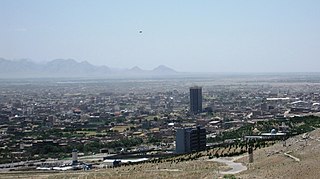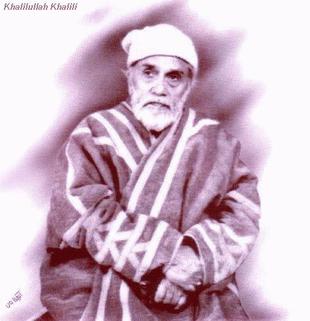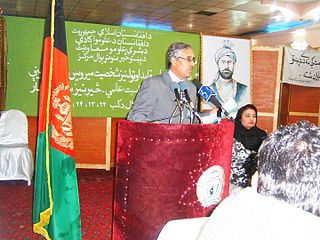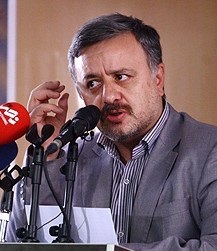Nazemi, Latif | |
|---|---|
| Born | 1947 Herat, Afghanistan |
| Occupation | Poet, writer |
Latif Nazemi (born 1947) is a Persian poet and literary critic from Afghanistan. [1] He currently lives in Frankfurt and works for Radio Deutsche Welle in Germany.
Nazemi was born in Herat, Afghanistan and graduated from Kabul University, where he later taught. [1] He is a student of "Persian literature" and has published a number of works in the field, including: Modern Dari Literature in Afghanistan.
Latif Nazemi first visited in Herat school. After high school he studied Persian literature (Dari) at the University of Kabul . He received his doctorate and taught the subject later as a lecturer. From 1982 to 1984 Nazemi taught Persian literature at Humboldt University of Berlin. Latif Nazemi has lived since 1990 with his wife and four sons in exile in Frankfurt, Germany and works for the Deutsche Welle radio station.
His book of poems Milad-e Sabz (Green Birth) was published in 1975 and received the Afghan prize for poetry. In addition to many published books, Latif Nazemi has also published several hundred articles in the Afghan and international press.

Herāt is an oasis city and the third-largest city of Afghanistan. In 2020, it had an estimated population of 574,276, and serves as the capital of Herat Province, situated south of the Paropamisus Mountains in the fertile valley of the Hari River in the western part of the country. An ancient civilization on the Silk Road between the Middle East, Central and South Asia, it serves as a regional hub in the country's west.

Dari, also known as Dari Persian, is the variety of the Persian language spoken in Afghanistan. Dari is the term officially recognised and promoted since 1964 by the Afghan government for the Persian language, hence it is known as Afghan Persian or Eastern Persian in many Western sources. As Professor Nile Green remarks "the impulses behind renaming of Afghan Persian as Dari were more nationalistic than linguistic" in order to create an Afghan state narrative. Apart from a few basics of vocabulary, there is little difference between formal written Persian of Afghanistan and Iran. The term "Dari" is officially used for the characteristic spoken Persian of Afghanistan, but is best restricted to formal spoken registers. Persian-speakers in Afghanistan still prefer to call their language “Farsi,” while Pashto-speakers may sometimes refer to it as "Parsi." Farsi Dari serves as the lingua franca for interethnic communications in Afghanistan.

Persian literature comprises oral compositions and written texts in the Persian language and is one of the world's oldest literatures. It spans over two-and-a-half millennia. Its sources have been within Greater Iran including present-day Iran, Iraq, Afghanistan, the Caucasus, and Turkey, regions of Central Asia and South Asia where the Persian language has historically been either the native or official language. For example, Rumi, one of the best-loved Persian poets, born in Balkh or Wakhsh, wrote in Persian and lived in Konya, at that time the capital of the Seljuks in Anatolia. The Ghaznavids conquered large territories in Central and South Asia and adopted Persian as their court language. There is thus Persian literature from Iran, Mesopotamia, Azerbaijan, the wider Caucasus, Turkey, Pakistan, Bangladesh, India, Tajikistan and other parts of Central Asia. Not all Persian literature is written in Persian, as some consider works written by ethnic Persians or Iranians in other languages, such as Greek and Arabic, to be included. At the same time, not all literature written in Persian is written by ethnic Persians or Iranians, as Turkic, Caucasian, and Indic poets and writers have also used the Persian language in the environment of Persianate cultures.

Abdul Rahman Pazhwak was an Afghan poet and diplomat. He was educated in Afghanistan and started his career as a journalist, but eventually joined the foreign ministry. During the 1950s, he became ambassador to the United Nations and served as president of the UN General Assembly from 1966 to 1967. During the early 1970s, he served for short periods as Afghan ambassador to West Germany and India. In 1976, he became ambassador to the United Kingdom. He served in that position until the 1978 Saur Revolution. He then returned to Afghanistan and was put under house arrest. He was allowed to leave for medical treatment in 1982 and received asylum in the United States, where he lived until 1991, before moving to Peshawar, Pakistan. Abdul Rahman Pazhwak died in Hayatabad in Peshawar on 8 June 1995. He was in Baghwani village off Surkh Road in Nangarhar Province, Afghanistan.

The culture of Afghanistan has persisted for over three millennia, tracing record to at least the time of the Achaemenid Empire in 500 BCE, and encompasses the cultural diversity of the nation. Afghanistan's culture is historically strongly connected to nearby Persia, including the same religion, as the people of both countries have lived together for thousands of years. Its location at the crossroads of Central, South and Western Asia historically made it a hub of diversity, dubbed by one historian as the "roundabout of the ancient world".

Fārsīwān is a contemporary designation for Persian speakers in Afghanistan and its diaspora elsewhere. More specifically, it was originally used to refer to a distinct group of farmers in Afghanistan and urban dwellers. In Afghanistan, original Farsiwans are found predominantly in Herat and Farah provinces. They are roughly the same as the Persians of eastern Iran. The term excludes the Hazāra and Aymāq tribes, who also speak dialects of Persian.
Nadia Anjuman was a poet from Afghanistan.

Khalilullah Khalili was Afghanistan's foremost 20th century poet as well as a noted historian, university professor, diplomat and royal confidant. He was the last of the great classical Persian poets and among the first to introduce modern Persian poetry and Nimai style to Afghanistan. He had also expertise in Khorasani style and was a follower of Farrukhi Sistani. Almost alone among Afghanistan's poets, he enjoyed a following in Iran where his selected poems have been published. His works have been praised by renowned Iranian literary figures and intellectuals. Many see him as the greatest contemporary poet of the Persian language in Afghanistan. He is also known for his major work "Hero of Khorasan", a controversial biography of Habībullāh Kalakānī, Emir of Afghanistan in 1929.
Raziq Faani was a renowned Afghan poet and novelist from the city Kabul. He published more than ten volumes of poetry and novels in Persian.

The history of Arabs in Afghanistan spans over one millennium since the 7th century. Most of the early Arabs gradually lost their Arabic hegemony and ultimately mixed with the local population, though they are still considered a cognizably distinct ethnic group according to the Constitution of Afghanistan. Afghans who carry Sayed or Quraishi in their names usually claim Arab ancestry.

Abdul Hai Habibi – ʿAbd' ul-Ḥay Ḥabībi) was a prominent Afghan historian for much of his lifetime as well as a member of the National Assembly of Afghanistan during the reign of King Zahir Shah. A Pashtun nationalist from Kakar tribe of Kandahar, Afghanistan, he began as a young teacher who made his way up to become a writer, scholar, politician and Dean of Faculty of Literature at Kabul University. He is the author of over 100 books but is best known for editing Pata Khazana, an old Pashto language manuscript that he claimed to have discovered in 1944; but the academic community does not unanimously agree upon its genuineness.

Massoud Nawabi also known as Ustad Nawabi, was an Afghan poet, writer, Director as well as a cultural personality, founder of Educational Committee for Afghan Refugees (ECAR), Afghan Cultural Center, Ghulam Habib Nawabi, Chief Administrator of the Afghan Ibn-e-Sina University and Principle of Ariana Mahajir High School. Massoud Nawabi was the Son of Ghulam Habib Nawabi, who was the last of the great Persian Poet and among the first to introduce modern Dari poetry to Afghanistan.

Daud Shah Saba is a politician in Afghanistan, who is serving as Governor of Herat Province since August 2010 when his predecessor Ahmad Yusuf Nuristani had resigned from the post.

Mohammad Kazem Kazemi is a notable contemporary Afghan poet, author, literary critic and a book editor by profession. Among others, he is currently a member of the editorial board of Dorre Dari and Khatt-e-Sevom Journals. Kazemi has authored many books on Persian literature and Afghan poetry. He has also written the book “Rozaneh” (Window) which has been published for the fourth time in Iran and is considered to be the most famous poetry textbook. He is currently living in Mashhad in the Islamic Republic of Iran.

Mohammad Sharif Saiidi is a poet from Afghanistan.

Afghan literature or literature of Afghanistan refers to the literature produced in the Islamic Emirate of Afghanistan. Influenced by Central and South Asian literature, it is predominantly written in two native and official languages of Afghanistan, Dari and Pashto. Some regional languages such as Uzbek, Turkmen, Balochi, and Pashayi also appears in Afghan literature. While Afghanistan is a multilingual country, these languages are generally used as oral compositions and written texts by the Afghan writers and in Afghan curriculum. Its literature is highly influenced by Persian and Arabic literature in addition to Central and South Asia.

Nasrollah Sarvari was an Afghan painter. His works often deal with historical, philosophical, natural landscapes, and the social life of the villagers. He was familiar with the styles of Romanticism, Realism and Classicism and was a follower of Behzad Heravi's style in miniature art.
Homaira Nakhat Dastgirzada, best known as Nakhat, was a well known Afghan poet. She wrote numerous pieces of Persian literature that were "very lyrical, with a lot of imagery." Dastgirzada was nicknamed the Blue Poet of Afghanistan
Khalida Furugh is an Afghan poet and academic. She is considered one of the country's leading female poets.